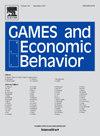非孤立、逆转和社会偏好
IF 1
3区 经济学
Q3 ECONOMICS
引用次数: 0
摘要
最近的证据表明,非孤立行为可以显著影响通过彩票整合使用随机问题选择(RPS)支付机制的实验室实验。理论工作还强调了社会偏好可能违反状态单调性,这是彩票整合情况下激励与RPS支付机制兼容的充分必要条件。此外,非隔离可以通过非结果性动态关注点影响决策。通过三个简单的实验和三个测试,我们考察了两种非隔离和逆转行为的发生。我们发现了积极逆转行为的重要证据,如果不公平的结果有另一种可能的实现(他们自己选择),受试者更有可能做出公平的选择。此外,就彩票整合和动态非后果性关注而言,非隔离流行率的下限估计分别约为10%和20%。本文章由计算机程序翻译,如有差异,请以英文原文为准。
Non-isolation, reversals, and social preference
Recent evidence suggests that non-isolation behavior could significantly impact laboratory experiments using the random problem selection (RPS) payment mechanism through lottery integration. Theoretical work also highlights social preferences that can violate statewise monotonicity, a necessary and sufficient condition for incentive compatibility with the RPS payment mechanism in case of lottery integration. Additionally, non-isolation can influence decisions through non-consequential dynamic concerns. In a series of three simple and parsimonious experiments and three tests, we examine the occurrence of the two kinds of non-isolation and reversal behaviors. We find significant evidence for positive reversal behavior, where subjects are more likely to make a fair choice if there is an alternative possible realization of an unfair outcome (which they chose themselves). In addition, the lower bounds for the prevalence of non-isolation in terms of lottery integration and dynamic non-consequential concern are estimated to be approximately 10% and 20%, respectively.
求助全文
通过发布文献求助,成功后即可免费获取论文全文。
去求助
来源期刊

Games and Economic Behavior
ECONOMICS-
CiteScore
1.90
自引率
9.10%
发文量
148
期刊介绍:
Games and Economic Behavior facilitates cross-fertilization between theories and applications of game theoretic reasoning. It consistently attracts the best quality and most creative papers in interdisciplinary studies within the social, biological, and mathematical sciences. Most readers recognize it as the leading journal in game theory. Research Areas Include: • Game theory • Economics • Political science • Biology • Computer science • Mathematics • Psychology
 求助内容:
求助内容: 应助结果提醒方式:
应助结果提醒方式:


